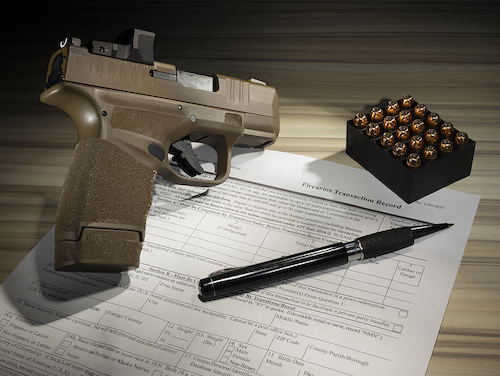 People who bought firearms at the height of the COVID-19 pandemic have higher rates of mental health problems and political extremism.
People who bought firearms at the height of the COVID-19 pandemic have higher rates of mental health problems and political extremism.
Research published in PLOS One found those who bought firearms during the pandemic had higher rates of self harm, suicidal thoughts and intimate partner violence when compared with those who don’t own firearms or firearms owners who bought firearms outside the height of the pandemic.
“As a group, the people who bought a gun during COVID were an extreme group of gun owners with high levels of suicidal thoughts and self-harm behaviors, intimate partner violence and antisocial behavior, mental health problems like depression, anxiety, and substance use problems, and they believed in QAnon and other conspiracy theories compared to non-gun owners and gun owners who didn’t buy a gun during pandemic. People who owned guns but didn’t buy one during the pandemic weren’t much different from non-gun owners,” Brian Hicks, PhD, author of the study and a clinical psychologist at University of Michigan Health told Theravive.
The researchers of the study say their findings suggest that those who bought firearms in the pandemic may have unique characteristics that could be identified to help prevent them harming themselves or others.
“That profile of suicidal thoughts and self-harm, prior violence, mental health and substance use problems, and paranoia includes most of the risk factors suicide and violence, especially gun related suicide and violence. This is a high-risk group of people especially because they now own a firearm which provides the means for suicide or violence,” Hicks said.
He argues that those who bought firearms in the height of the COVID pandemic, regardless of if they had previously purchased a fire arm, were far more likely to be distressed at the time they bought them.
By contrast, those who already owned firearms prior to COVID and who didn’t buy any during the first 18 months of the pandemic were less likely to have mental health problems.
The researchers were able to identify a number of key differences between pandemic firearms buyers and those who did not purchase guns during the pandemic.
55% of people who bought firearms in the pandemic had thoughts of suicide in the previous two weeks. By comparison, 10% of people who owned guns prior to the pandemic and 6% of people who did not own guns at all experienced thoughts of suicide.
Pandemic firearms buyers were also significantly younger than those in the other groups. More than half were in their 30s whilst 70% were under the age of 40.
A pandemic firearm buyer was more likely to be white and male.
56% of people who bought guns in the pandemic reported that they either occasionally or frequently punched, slapped, hit, shoved or punched their romantic partner. By comparison, less than 2% of people who either already owned guns pre pandemic or who don’t own guns reported the same thing.
Pandemic firearm buyers were more likely to hold Christian Nationalistic belief and endorse QAnon conspiracies. 76% of the pandemic gun buyers surveyed agreed with the QAnon statement “the government, media, and financial worlds in the U.S. are controlled by a group of Satan-worshipping pedophiles who run a global child sex trafficking operation.” By comparison, 15% of the other groups combined believed this.
The study involved 1063 adults in the US drawn from 47 states as well as Washington DC. Whilst the sample is not nationally representative, researchers recruited participants to approximate the US adult population.
6 million firearms were sold to first time buyers in mid-2020 and the researchers say that their study has important implications for local state and national firearm policy, as well as safety.
“People buy guns for different reasons. Some were probably scared about the social and economic disruptions of the pandemic and thought that buying a gun provided some kind of extra protection if things went bad. Those people are probably more anxious or susceptible to conspiracy theories or buy into the rhetoric of gun culture about the necessity of owning guns for defense. I also think that first time gun buyers might be driving a lot of the effects. I think a significant proportion of first-time gun buyers are thinking about killing themselves or someone else when they buy a gun and so are in a state of high psychological distress. That’s an issue all the time but the pandemic probably made that worse,” Hicks said.
“A lot of people bought guns during COVID who due to their risk profile probably shouldn’t have them. Most of those people still have those guns and if they haven’t dealt with their mental health problems they’re still at high risk for firearm suicide or violence. The best thing would be for a lot of these people to get rid of their guns or give them to a responsible person for safe keeping until they no longer feel suicidal or are being violent with other people especially their intimate partners and have a better handle on any mental health and substance use problems. Having access to lethal means greatly increases the risk of suicide or violence.”
Elizabeth Pratt is a medical journalist and producer. Her work has appeared on Healthline, The Huffington Post, Fox News, The Australian Broadcasting Corporation, The Sydney Morning Herald, News.com.au, Escape, The Cusp and Skyscanner. You can read more of her articles here. Or learn more about Elizabeth and contact her via her LinkedIn and Twitter profiles.